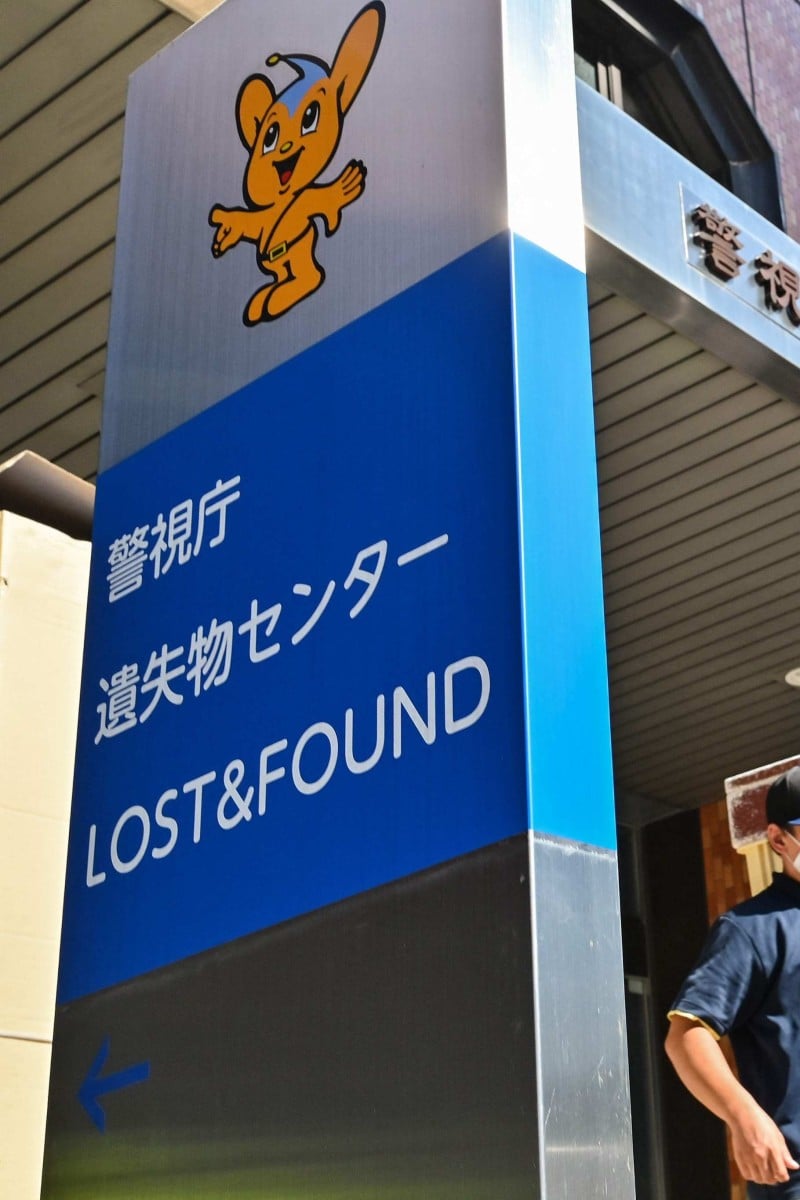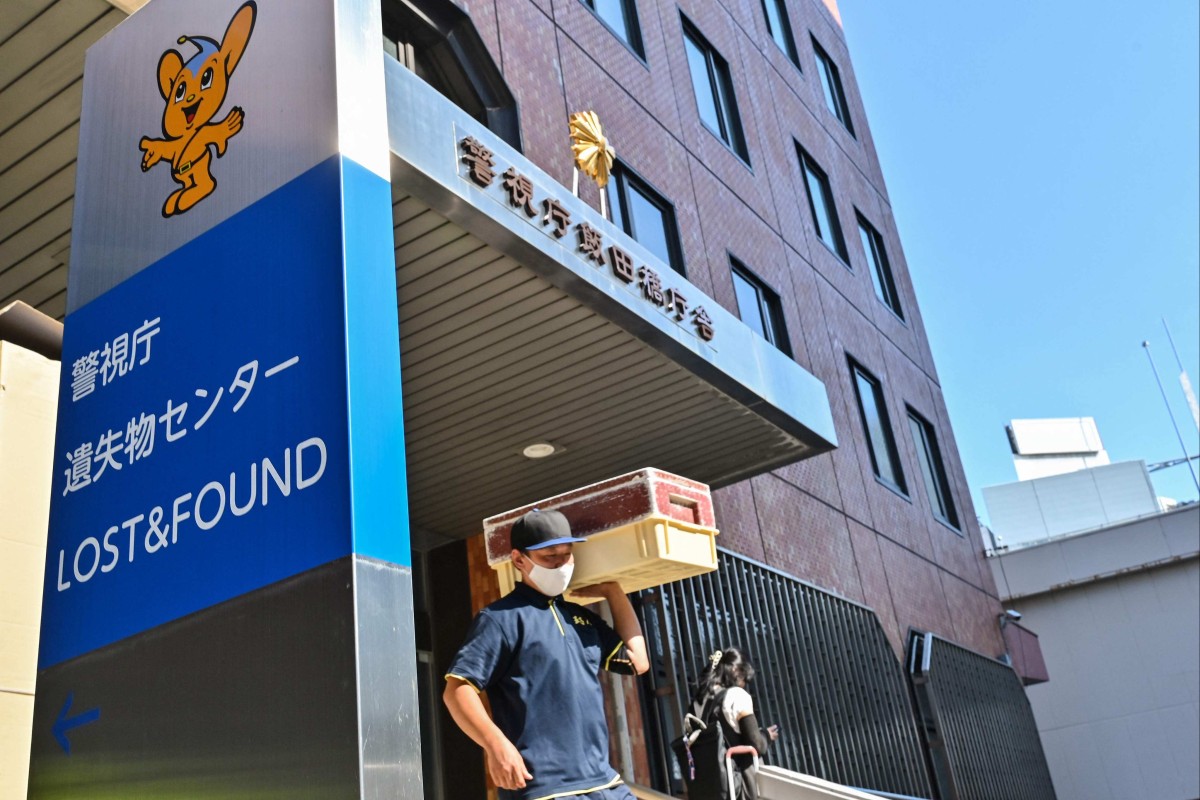
Listen Up: Tokyo police’s lost-and-found haven for keys, flying squirrels and more
Practise your English with our short listening exercises: play the audio, answer the questions, and check the answers at the bottom of the page.
 Tokyo’s police reunite millions of lost items with owners, from umbrellas to flying squirrels. Photo: AFP
Tokyo’s police reunite millions of lost items with owners, from umbrellas to flying squirrels. Photo: AFPQuestions
1. How many people live in Tokyo?
A. four million
B. 14 million
C. 40 million
D. 140 million
2. If you take “meticulous” care of something, you …
A. sell it.
B. ignore it.
C. throw it away.
D. none of the above
3. What are Japanese children taught, according to the podcast?
A. to report lost items
B. to take care of their belongings
C. to only buy items that they need
D. to go to the police station whenever they need help
4. What are the two things that people lose most often?
A. driving licences and ID cards
B. credit cards and books
C. keychains and ID cards
D. umbrellas and driving licences
5. What happens to the animals that end up in the police stations?
A. They are released into the wild.
B. They are sent to animal shelters.
C. The staff take care of them.
D. The staff adopt them.
6. What percentage of lost keychains are claimed by their owners?
A. 17 per cent
B. 70 per cent
C. 77 per cent
D. information not given
7. Why is the centre receiving more lost items?
A. because it moved to a busier part of the city
B. because there are more tourists
C. because people are buying more expensive items
D. because people are becoming more forgetful
8. How long has the lost-and-found centre been around?
A. since the 1940s
B. since the 1950s
C. since the 1960s
D. since the 1970s
9. What item has its own special floor?
A. umbrella
B. driving licence
C. book
D. ID card
10. What happens during the rainy season in the centre?
A. The centre closes.
B. The centre is flooded.
C. The centre has a sale on umbrellas.
D. The centre is full of umbrellas.
11. Identify the incorrect sentences based on the podcast, and rewrite them so that they are correct.
(i) The Tokyo police lost-and-found centre only handles valuable items.
(ii) Details of the lost item are noted and entered into a system.
(iii) The item is categorised and stored in the station.
(iv) The item is kept indefinitely until its owner collects it.
(v) More people are losing their pets these days.
Answers
1. B
2. D
3. A
4. A
5. C
6. D
7. B
8. B
9. A
10. D
11. (i) The Tokyo police lost-and-found centre handles all sorts of items (accept all similar answers); (ii) correct; (iii) correct; (iv) The item is kept for three months; (v) More people are losing wireless earphones and handheld fans these days.
Script
Adapted from Agence France-Presse
Voice 1: Lost your umbrella, keys or a flying squirrel? In Tokyo, the police are almost certainly taking meticulous care of it. In Japan, lost items are rarely disconnected from their owners for long, even in a mega city like Tokyo, which has a population of 14 million.
Voice 2: Hiroshi Fujii is a 67-year-old tour guide. He says that foreign visitors are often surprised when they get their lost things back, but it is common in Japan to report found items, and this is something that parents teach their children.
Voice 1: Harumi Shoji is the director of the police lost-and-found centre in Tokyo’s central Iidabashi district. According to Shoji, around 80 staff ensure items are well organised using a database system. Everything is tagged and sorted to hasten a return to its rightful owner.
Voice 2: Shoji said that ID cards and driving licences are most frequently lost. But dogs, cats and even flying squirrels have been dropped off at police stations. Officers look after them, consulting books, online articles and vets for advice.
Voice 1: More than 4 million items were handed into Tokyo Metropolitan Police last year. About 70 per cent of valuables, such as wallets, phones and important documents, were successfully reunited with their owners. Even if it is just a key, the staff enter details such as the mascot keychain it is attached to.
Voice 2: Over the course of one afternoon, dozens of people come to collect or search for their lost property at the centre. The station receives items left with railway station staff or at small local police stations across Tokyo if they are not claimed within two weeks. If no one turns up at the police facility within three months, the unwanted item is sold or discarded.
Voice 1: Shoji said that the number of lost items handled by the centre is increasing as Japan welcomes a record influx of tourists after the pandemic and as gadgets become smaller. Wireless earphones and handheld fans are an increasingly frequent sight at the lost-and-found centre, which has been operating since the 1950s.
Voice 2: Shoji said that a whopping 200 square metres is dedicated to lost umbrellas – 300,000 of which were brought in last year, with only 3,700 of them returned. They even have a special floor for umbrellas, and during the rainy season, there are so many umbrellas that the umbrella trolley is full, and they have to stack them in two layers.